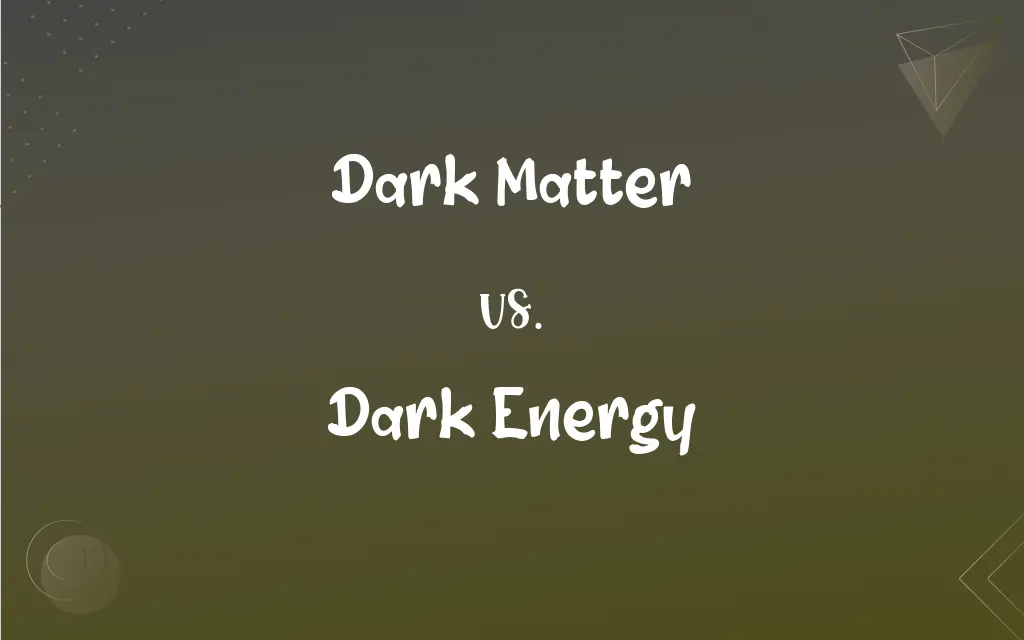Dark Matter vs. Dark Energy: What's the Difference?
Edited by Janet White || By Harlon Moss || Updated on October 14, 2023
Dark matter gravitationally attracts while dark energy drives the universe's acceleration. Dark matter clumps, dark energy is uniform.

Key Differences
Dark matter is believed to contribute to gravitational forces, while dark energy is thought to drive the expansion of the universe. These two concepts derive from astrophysical observations rather than direct detection. Observations indicate the presence of gravitational effects inconsistent with observable matter, attributed to dark matter. Meanwhile, the accelerating expansion of the universe, contrary to expectations, leads scientists to postulate the existence of dark energy.
Dark matter and dark energy together compose about 95% of the universe's total mass-energy content, with dark matter contributing about 27% and dark energy about 68%. It's intriguing to acknowledge that the vast majority of the universe is made up of these unseen and yet undetected elements. The composition of dark matter and dark energy is one of the unsolved mysteries in the realm of cosmology and astrophysics, prompting researchers to delve deeper into their exploration.
Dark matter can cluster and form structures, whereas dark energy appears to have a smooth, uniform distribution across the universe. Through the lens of cosmology, dark matter behaves as a "glue," holding galaxies together, and without it, they would fly apart. Dark energy, conversely, seems to work against gravity, causing the universe to expand at an accelerating rate, and thus, it behaves quite oppositely to dark matter.
Understanding dark matter and dark energy is fundamental to unraveling the secrets of the cosmos. Even though dark matter and dark energy are intangible and non-observable directly, their existence is inferred from their gravitational and repulsive effects, respectively. Investigating them allows scientists to comprehend the universe’s structure, expansion, and potentially its fate, bridging gaps in our understanding of the cosmos and paving the way for new discoveries.
Comparison Chart
Nature
Attractive
Repulsive
ADVERTISEMENT
Effect on Universe
Binds galaxies
Accelerates expansion
Distribution
Clumpy
Uniform
Percent of Universe
Approx. 27%
Approx. 68%
Detectability
Indirect (via gravity)
Indirect (via expansion)
Dark Matter and Dark Energy Definitions
Dark Matter
A hypothetical form of matter that exerts gravitational forces.
Dark matter binds galaxies together through its gravitational effects.
ADVERTISEMENT
Dark Energy
Enigmatic in origin and nature.
Scientists are yet to pinpoint the exact properties and origins of dark energy.
Dark Matter
Constituent that affects galactic structures.
Without dark matter, our galaxy would likely disband due to insufficient gravitational pull.
Dark Energy
Opposes the effects of gravity on cosmic scales.
Dark energy pushes galaxies apart, fighting against the gravitational pull of dark matter.
Dark Matter
A significant component of the universe’s mass.
Though undetectable directly, dark matter significantly influences cosmic structures.
Dark Energy
Dominant constituent of the universe.
Dark energy constitutes around 68% of the universe’s energy density.
Dark Matter
Non-baryonic, non-luminous substance in space.
Dark matter does not emit, absorb, or reflect light, making it invisible.
Dark Energy
A mysterious force driving cosmic acceleration.
Dark energy propels the expansion of the universe, counteracting gravitational attraction.
Dark Matter
Unknown and undetected in electromagnetic spectrum.
Scientists infer the existence of dark matter from its gravitational impact on visible celestial bodies.
Dark Energy
Uniformly distributed throughout the universe.
Dark energy permeates space, exerting a consistent force everywhere.
FAQs
What is dark matter?
Dark matter is a form of matter that doesn't emit, absorb, or reflect light and is detectable through its gravitational effects.
What is dark energy?
Dark energy is a mysterious force that opposes gravity and is believed to be responsible for the accelerating expansion of the universe.
How was dark energy discovered?
Dark energy was proposed following observations of distant supernovae that appeared to be moving away from Earth faster than expected, suggesting the universe's expansion is accelerating.
How much of the universe is made up of dark matter and dark energy?
Approximately 27% of the universe is dark matter and about 68% is dark energy, with the rest being normal matter.
Can we see dark matter?
Dark matter cannot be observed directly because it doesn't interact with electromagnetic forces, which means it doesn't absorb, emit, or reflect light.
How is dark matter detected?
Dark matter is detected indirectly through its gravitational effects on visible matter, radiation, and the large-scale structure of the universe.
Why is dark matter important in the universe?
Dark matter gravitationally binds galaxies and galaxy clusters together, providing the "glue" that prevents them from falling apart.
Is dark matter a particle?
Though not yet confirmed, many scientists believe dark matter may be composed of undiscovered particles, and numerous experiments are seeking to identify them.
Can dark energy be harnessed for human use?
Currently, dark energy remains a theoretical construct and cannot be harnessed or utilized for human purposes.
Does dark energy have any relation to dark matter?
Dark energy and dark matter are distinct in nature and effect but are jointly considered in cosmological models due to their combined influence on the universe's structure and expansion.
Can dark energy turn into dark matter or vice versa?
There's no evidence or prevailing theory suggesting that dark energy and dark matter can transform into each other.
What are the effects of dark energy on the universe?
Dark energy contributes to the accelerated expansion of the universe, countering the gravitational attraction exerted by matter.
What is the cosmic role of dark energy?
Dark energy impacts the universe's fate, geometry, and expansion rate by counteracting gravity and facilitating accelerated cosmic expansion.
Why is dark energy perplexing to scientists?
Dark energy challenges our understanding of physics, especially concerning why it exists in the quantity it does and its precise effects on the future of the universe.
Where is dark matter located?
Dark matter is present throughout the universe, including within galaxies where it helps to bind stars together.
Is dark matter theory universally accepted?
While widely accepted, there are alternative theories to dark matter, like Modified Newtonian Dynamics (MOND), which adjusts classical physics to explain galactic behaviors.
Why is it called "dark" matter and "dark" energy?
The term "dark" is used because both dark matter and dark energy do not interact with light (electromagnetic radiation) and are invisible and mysterious.
Are dark matter and dark energy evenly distributed in the universe?
Dark matter is clumpy and helps form the structural skeleton of the universe, while dark energy appears to be smoothly distributed throughout it.
Does our planet contain dark matter?
Yes, dark matter particles are believed to pass through Earth, though they interact weakly with normal matter and are thus hard to detect.
Is there a possibility that dark matter and dark energy do not exist?
While widely recognized, some scientists explore alternative theories, though none have yet provided as coherent and comprehensive an explanation for observed cosmic phenomena as dark matter and dark energy theories.
About Author
Written by
Harlon MossHarlon is a seasoned quality moderator and accomplished content writer for Difference Wiki. An alumnus of the prestigious University of California, he earned his degree in Computer Science. Leveraging his academic background, Harlon brings a meticulous and informed perspective to his work, ensuring content accuracy and excellence.
Edited by
Janet WhiteJanet White has been an esteemed writer and blogger for Difference Wiki. Holding a Master's degree in Science and Medical Journalism from the prestigious Boston University, she has consistently demonstrated her expertise and passion for her field. When she's not immersed in her work, Janet relishes her time exercising, delving into a good book, and cherishing moments with friends and family.































































